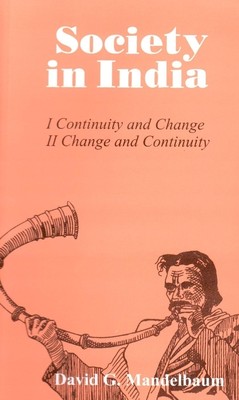Society in India
his analysis of Indian society is the most comprehensive study that has been done in recent times. It brings together the results of modern social research to reveal the regular patterns that underlie social relations throughout the country; it also outlines some of the principal social and regional variations. Professor Mandelbaum views social relations in India as systems and parts of systems and shows that Indian society has not been static or stagnant. as is often asserted, but has been continually adapting, mainly on the basis of certain deep-lying psychological and social themes.
Volume One opens with the concepts of social system and of caste order and then defines the major components of Indian society Family and kinship relations are next discussed. with particular attention to the relevance of family relations in the larger society. These chapters note the cultural effects of kinship networks and the psychological effects of the tensions inherent in family relations.
Hierarchical ranking is central to relations among people of different caste groups. or jatis; the next section of this volume explains how jati rankings ate made on the basis of both ritual criteria and secular criteria. Hierarchy is significant within a jati as well as among jatis. The chapters on jati organization describe how the members of a jati maintain their group and suggest why oppositions within a jati commonly arise Volume Two deals mainly with social change. The opening chapters examine the village as a social entity in the context of the changing, larger entities of state and civilization. Two kinds of social change, recurrent and systemic, are considered. Recurrent changes have come about through social mobility, through religious movements, and through the absorption of ribal peoples. The final chapters summarize the discussion of psychological forces and social processes in Indian society and appraise the trends of modern social change.
Volume One opens with the concepts of social system and of caste order and then defines the major components of Indian society Family and kinship relations are next discussed. with particular attention to the relevance of family relations in the larger society. These chapters note the cultural effects of kinship networks and the psychological effects of the tensions inherent in family relations.
Hierarchical ranking is central to relations among people of different caste groups. or jatis; the next section of this volume explains how jati rankings ate made on the basis of both ritual criteria and secular criteria. Hierarchy is significant within a jati as well as among jatis. The chapters on jati organization describe how the members of a jati maintain their group and suggest why oppositions within a jati commonly arise Volume Two deals mainly with social change. The opening chapters examine the village as a social entity in the context of the changing, larger entities of state and civilization. Two kinds of social change, recurrent and systemic, are considered. Recurrent changes have come about through social mobility, through religious movements, and through the absorption of ribal peoples. The final chapters summarize the discussion of psychological forces and social processes in Indian society and appraise the trends of modern social change.
Top rated books in this category





















